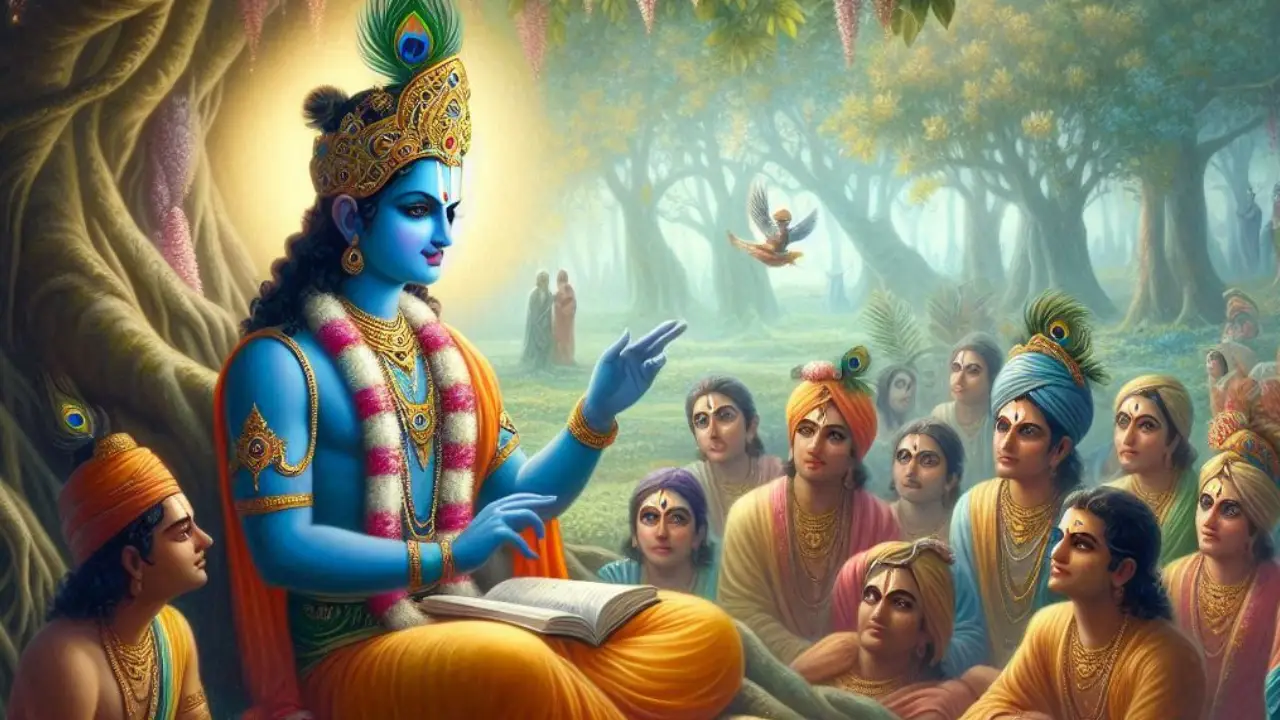Lord Krishna stands as one of the most revered figures in Hindu mythology, embodying wisdom, valor, and divine love. His teachings, particularly those found in the Bhagavad Gita, offer profound insights into the philosophy of Advaita Vedanta, a non-dualistic school of thought that emphasizes the oneness of the individual soul (Atman) and the ultimate reality (Brahman).
The Essence of Advaita Vedanta
Advaita Vedanta, founded by Adi Shankaracharya in the 8th century, asserts that there is no distinction between the soul and Brahman. According to this philosophy, the perceived duality in the world is an illusion (Maya). The ultimate goal is to transcend this illusion and realize the oneness with Brahman. This realization brings about liberation (Moksha) from the cycle of birth and death.
Krishna’s Role in the Bhagavad Gita
In the Bhagavad Gita, Lord Krishna serves as a guide to the warrior Arjuna, who is confused and morally troubled on the battlefield of Kurukshetra. Krishna imparts wisdom that integrates the core principles of Advaita Vedanta. His teachings underscore the importance of self-realization and the understanding that the true self is eternal and beyond physical existence.
Key Teachings of Krishna on Non-Duality
The Eternal Soul: Krishna emphasizes that the soul is eternal, imperishable, and beyond the physical body. He says, “Just as a person sheds worn-out garments and wears new ones, similarly, the soul discards its worn-out bodies and enters new ones” (Bhagavad Gita 2:22). This aligns with the Advaitic view that the soul and Brahman are one and immortal.
Detachment and Duty: Krishna advises Arjuna to perform his duty without attachment to the results. This concept of Nishkama Karma, or selfless action, is central to Advaita Vedanta, where actions are performed as a form of worship and a means to purify the mind, leading to the realization of the non-dual nature of reality.
Self-Knowledge: The pursuit of self-knowledge is paramount in Krishna’s teachings. He states, “When a man dwells on the objects of sense, attachment to them is born; from attachment, desire is born; from desire, anger is born” (Bhagavad Gita 2:62). Self-knowledge helps one rise above these lower tendencies and perceive the true nature of the self.
Living the Advaita Vedanta Philosophy
Incorporating the teachings of Lord Krishna into daily life involves a profound shift in perspective and behavior. Here are some practical ways to live this philosophy:
Mindfulness and Meditation: Regular meditation helps quiet the mind and fosters a deeper understanding of one’s true nature. Through mindfulness, one can observe thoughts and actions without attachment, aiding in the realization of non-duality.
Selfless Service: Engaging in activities that benefit others without expecting rewards cultivates humility and reduces ego, bringing one closer to the essence of Advaita Vedanta.
Study and Reflection: Reading scriptures like the Bhagavad Gita and reflecting on their meanings can deepen one’s understanding of non-duality. Discussing these ideas with others can also provide new insights and reinforce learning.
Stories Illustrating Advaita Vedanta
Consider the story of Swami Vivekananda, who experienced a profound realization of non-duality. While meditating, he felt an overwhelming sense of oneness with the universe, transcending his individual ego. This experience mirrors Krishna’s teachings on the unity of the soul and Brahman.
Another example is the life of Ramana Maharshi, a revered sage who taught the practice of self-inquiry. By asking, “Who am I?” he encouraged seekers to look beyond their physical and mental identities to discover their true, eternal nature.
The Impact of Realizing Non-Duality
Understanding and experiencing non-duality can transform one’s life. It brings inner peace, reduces fear of death, and fosters compassion for all beings. Recognizing the interconnectedness of life leads to a more harmonious existence and a profound sense of purpose.
Embracing the Path of Oneness
Lord Krishna’s teachings in the Bhagavad Gita provide a clear path to understanding and living the principles of Advaita Vedanta. By embracing these teachings, one can transcend the illusion of duality and realize the ultimate truth of oneness with Brahman. This journey requires dedication, reflection, and an open heart, but the rewards are boundless peace and liberation.
What are your thoughts on Krishna’s teachings and the philosophy of Advaita Vedanta? Share your insights and experiences in the comments below. Let’s engage in a meaningful discussion and explore these profound concepts together.





